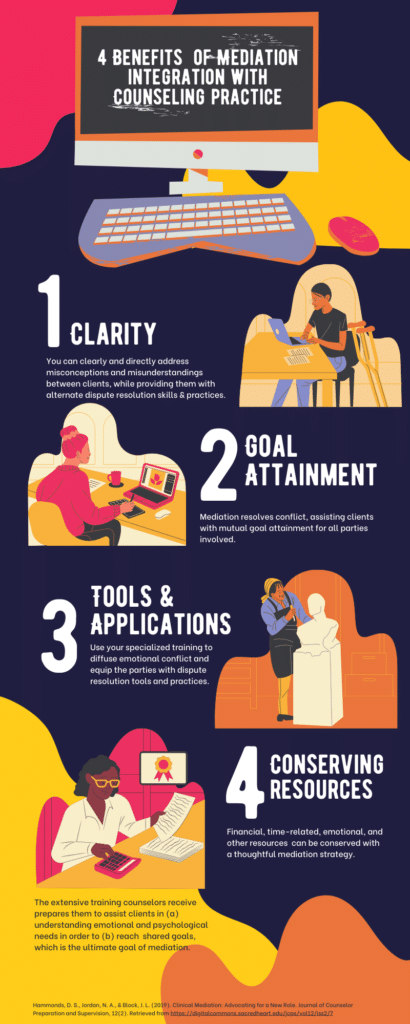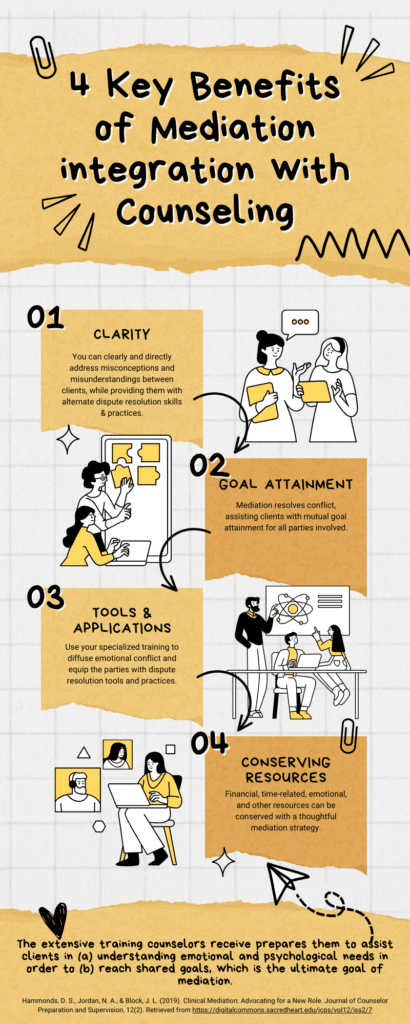Stronger Together
Mediator Therapists: A Review
Mediation – An Integral Part of Therapy
In her 2020 article about mediation in family and couples therapy, therapist Pamela Garber, LMHC, describes her journey as a therapist who integrated mediation into her private therapy practice after nearly 20 years. Garber argues that she found an “unquestionable link” between the philosophy of mediation and the therapeutic family systems approach to family and couples therapy. She articulates the similarities between the two: both require awareness of the other’s point of view, leading to a fair compromise. Through the use of empathy and communication, mediators and therapists alike assist clients move beyond an adversarial stance, seeking revenge and vindication, toward mutual understanding and progress toward shared goals.
Garber does not limit her application of mediation to joint therapy sessions, either. She contends that effective individual therapy mirrors many of the core tenets of mediation practice and philosophy, including understanding diverse points of view, “forward/future thinking,” and prioritizing moving forward through and beyond conflict. Whereas therapy may orient toward the past, mediation is often future-focused. Nevertheless, the three-pronged approach to therapy (1. dealing with psychological traumas and past experiences; 2. analytically and cognitively understanding the “why” of those past experiences; and 3. “identifying the advantages of moving forward, beyond resentment and free from preoccupation”). Garber suggests that mediation assists in the second and third prongs, but uses therapeutic work in the first prong as a foundation or platform upon which the latter two may be developed and explored.
Finally, Garber presents a case study of individual therapy in which she used therapeutic and mediation approaches to address conflict and compromise, even when the other party implicated in the individual client’s work was not present in the session. In short, using the therapeutic process to analyze mediation constructs like understanding another’s point of view, expressing empathy, and “bargaining” in a hypothetical sense can assist clients in processing past traumas as they engage in a sort of mediated process.
Balancing Roles: Psychologist Mediators and the Value of Counselor Training in Mediation
Ilene Diamond, clinical psychologist, attorney, and mediation consultant, makes a similar case for the value of psychological training and counseling practice in mediation. Importantly, though, Diamond clarifies the roles of a psychologist and mediator in the context of mediation: a clinical psychologist, therapist, or counselor engaged in mediation does not provide therapy, diagnosis or treatment in mediation. Rather, they draw on their training and education in the therapeutic process to assist parties in a mediation understand the nature and cause(s) of the conflict, orient toward the future and possible solutions, and work together to reach a mutually-beneficial outcome through mediation.
Training as a psychologist, counselor, and therapist also offers a refreshingly different perspective than many attorney-mediators and others without training in psychology and the social sciences. Training in psychology and counseling provides insight into emotional impacts, interior psychological “landscapes,” and how meaning is derived from experience. By using those perspectives and understanding in mediation, the therapist mediator can assist clients in their own self-awareness and understanding, acknowledgment of the other’s point of view, and goal-oriented movement toward consensus, agreement, and settlement.
In her article, Diamond discusses one reality of mediation services and Alternate Dispute Resolution in the United States: most mediators are attorneys or in some way affiliated with the legal profession, from practicing attorneys whose firms have a mediation program to retired judges who practice mediation in retirement. While knowledge of the legal system confers specific, valuable benefits to practitioners and clients alike, legal, attorney-based mediation may lack the therapist’s perspective and understanding of human emotion, trauma experiences, and the psychological underpinnings of behavior. Each of these, if properly understood, can assist mediation clients in assessing their own perspectives (and those of other parties), understanding motivations and interests, and ultimately moving toward resolution and a desired outcome.
Psychologist mediators are better prepared than non-therapists to handle the range of emotions expressed in mediation. They also bring knowledge of mental health that will likely impact negotiations and discussions, whether a client suffers from substance abuse disorder or has a borderline personality. It is not uncommon for non-therapist mediators to refer clients for therapy. While psychologist-mediators do not offer therapy in mediation, their specialized training can assist clients navigate the complexities of mediated disputes.
Diamond discusses the various mediation contexts where a therapist mediator most effectively practices. Family, divorce, harassment, employment discrimination, and specialized cases involving medical and psychiatric facilities or malpractice suits are just a few areas where the counselor, psychologist, or therapist’s expertise may be invaluable. In any mediation, the skills of empathy, validation, and respect are essential, and most mediators are trained to engage with clients using those practices. Yet psychologist mediators have a deeper awareness and training in dealing with loss, finding meaning and dignity in personal experiences, and “appropriately paced process[es]” for dealing with the emotional impact of disputes and conflict resolution.
Citations
Diamond, I. (2011). The Value of a Psychologist Mediator. Mediate.com. Retrieved from https://mediate.com/the-value-of-a-psychologist-mediator/.
Garber, P. (2020). Mediation – An Integral Part of Effective Individual Therapy Sessions. Academy of Professional Family Mediators. Retrieved from https://apfmnet.org/mediation-an-integral-part-of-effective-individual-therapy-sessions/.
Counselor/Therapist Ad Packages
Counselor/Therapist Ad Packages
Counseling + Mediation = More Client Resources
Our clients need counseling. Your clients need mediation.
Advertise with VirNet Mediation to quickly and easily make and receive referrals through our national network of providers.
Partner with VirNet Mediation and take advantage of our vast state and national network.
We’re stronger together.
Advertise with VirNet - View Sample Ad Below
Place Your Ad on 3-5 City and State Pages
Clinical Mediation and Counseling Practice: A Review
Conflict resolution, mediation and counseling go hand-in-hand; formal counselor training can further integrate the mutually beneficial skills of counseling practice and various forms of dispute resolution, including mediation.
In their 2019 article, “Clinical Mediation: Advocating for a New Role,” Appalachian State University authors Dominique S. Hammonds, Nickolas A. Jordan, and Jessica L. Block argue that counselor training programs often fail to provide adequate training for mediation and counseling. This is especially true when evaluating, understanding, and dealing with emotions shaping conflict and those that prevent mutual goal attainment. The authors contend that mediation and counseling should be co-taught, in order to enhance both practices.
Mediation and Counseling: The State of Practice
Despite the obvious connections between mediation and counseling, practitioners who offer both services are exceptions to the rule. As the authors point out, though, counselors are uniquely positioned with their skills and training to provide effective mediation, due to their “counseling skills and increased emotional intelligence.” n.p.
The intersection of mediation and counseling practice is one that has not been fully explored in counselor education programs, but it is an area that warrants further development and exploration by practitioners and educators alike.
The Relationship Between Mediation and Counseling
Defining Mediation
As a form of dispute resolution, mediation is less formal than the process of arbitration (often used in lieu of litigation in the courts), but more structured than informal methods of resolving family, employment, community, or other types of disputes. Mediation involves a neutral third-party mediator who facilitates discussions and negotiations used to resolve any number of disputes.
The ultimate goal of mediation is a mutually beneficial resolution of disputes and mutual goal attainment. Unlike the adversarial court process, mediation offers parties a chance to discuss and choose their own outcomes, rather than deferring those decisions to an arbiter, judge, or other third party. Finally, unlike other forms of Alternate Dispute Resolution (ADR) like arbitration, mediation offers a neutral third-party mediator who has no stake in the outcome and final resolution, though certain ethical considerations apply to the process of mediation.
Many mediators are practicing attorneys, though their training in legal systems and adversarial processes contrasts strongly with counseling education and specialty areas in counseling such as addictions, clinical mental health, rehabilitation, marriage/couple/family, and others. Counselors and other non-attorney practitioners are uniquely suited to provide an alternative perspective and approach in mediation.
The Benefits of Mediation
Mediation offers a number of benefit to parties engaged in this form of alternate dispute resolution, including each of the following:
-
- Clearly and directly addressing misconceptions and misunderstandings;
- Seeking resolution of conflict, including mutual goal attainment;
- Diffusing emotional conflict and equipping the parties with dispute resolution tools and practices; and
- Conserving resources (financial, time-related, emotional, and other resources) that would otherwise result in lengthy, costly court battles, emotional distress, and other negative outcomes.
Emotional Intelligence, Mediation and Counseling
The authors contend that the extensive training counselors receive in Mayer, Caruso, and Salovey’s four branch model of emotional intelligence prepares them to assist clients in (a) understanding emotional and psychological needs in order to (b) reach shared goals. This is the goal of mediation: individual and mutual understanding that leads to resolution of conflict and mutual goal attainment.
Emotional intelligence, defined originally by Salovey and Mayer, conceptualizes the way individuals problem-solve and understand the world around them (one’s “ways of knowing”). The four branch model recognizes an individuals’
-
- perception of emotions;
- use of emotions to facilitate thought;
- understand emotions; and
- manage one’s own emotions and those of others.
The authors note the progressive, developmental nature of this model. At the same time, less is known about the abilities and mental states that support emotional intelligence.
Nevertheless, perceiving emotions through vocalizations, expressions, behavior, and forms of communication reflects one’s perception of emotions. Similarly, relating emotionally to the experiences of others reflects the ability to understand emotions, and understanding the meaning, context, and impact of emotions represents the use of emotions to facilitate thought. Finally, evaluating and managing strategies to handle emotional responses (by one’s self and others) demonstrates an ability to manage emotions effectively.
The Takeaway: Mediation and Counseling Go Hand-in-Hand
Ultimately, the goals of mediation and the practice of counseling align well, and skilled counselors should deepen their knowledge and skill in dispute resolution practices and methods, including mediation. The symbiosis between mediation and counseling should translate into intentional curricular shifts that require dispute resolution practices and methods in counselor education. Practitioners, likewise, should explore mediation and the possibility of integrating mediation into their own practices, either directly or through professional partnerships that facilitate dispute resolution outside of therapy. Clients benefit from a counselor’s added skills in mediation and alternate dispute resolution, and mediation can support therapeutic work when legal or other issues outside of counseling can be addressed systematically and intentionally through mediation.
Citation
Hammonds, D. S., Jordan, N. A., & Block, J. L. (2019). Clinical Mediation: Advocating for a New Role. Journal of Counselor Preparation and Supervision, 12(2). Retrieved from https://digitalcommons.sacredheart.edu/jcps/vol12/iss2/7
Counselor/Therapist Ad Packages
Counselor/Therapist Ad Packages
Counseling + Mediation = More Client Resources
Our clients need counseling. Your clients need mediation.
Advertise with VirNet Mediation to quickly and easily make and receive referrals through our national network of providers.
Partner with VirNet Mediation and take advantage of our vast state and national network.
We’re stronger together.
Advertise with VirNet - View Sample Ad Below
Place Your Ad on 3-5 City and State Pages
Need Counseling?
Contact VirNet’s preferred counseling and therapy providers in your city.

Javier Espinoza, LCSW
New Beginnings Counseling center
With over 18 years of experience, I specialize in addressing barriers to life’s fullness in relationships, spirituality, and personal mental health. In my inclusive and non-judgmental office space, individuals explore their lives freely, using EMDR and cognitive behavioral approaches to therapy. Having lived and worked in several countries, I prioritize a culturally sensitive approach. I hold a BA from Northwestern University and a graduate degree from Eastern Washington University. I am a licensed Clinical Social Worker, and am currently taking clients throughout Washington, either in-person in Seattle or online with telehealth services anywhere in the state.
Stronger Together

